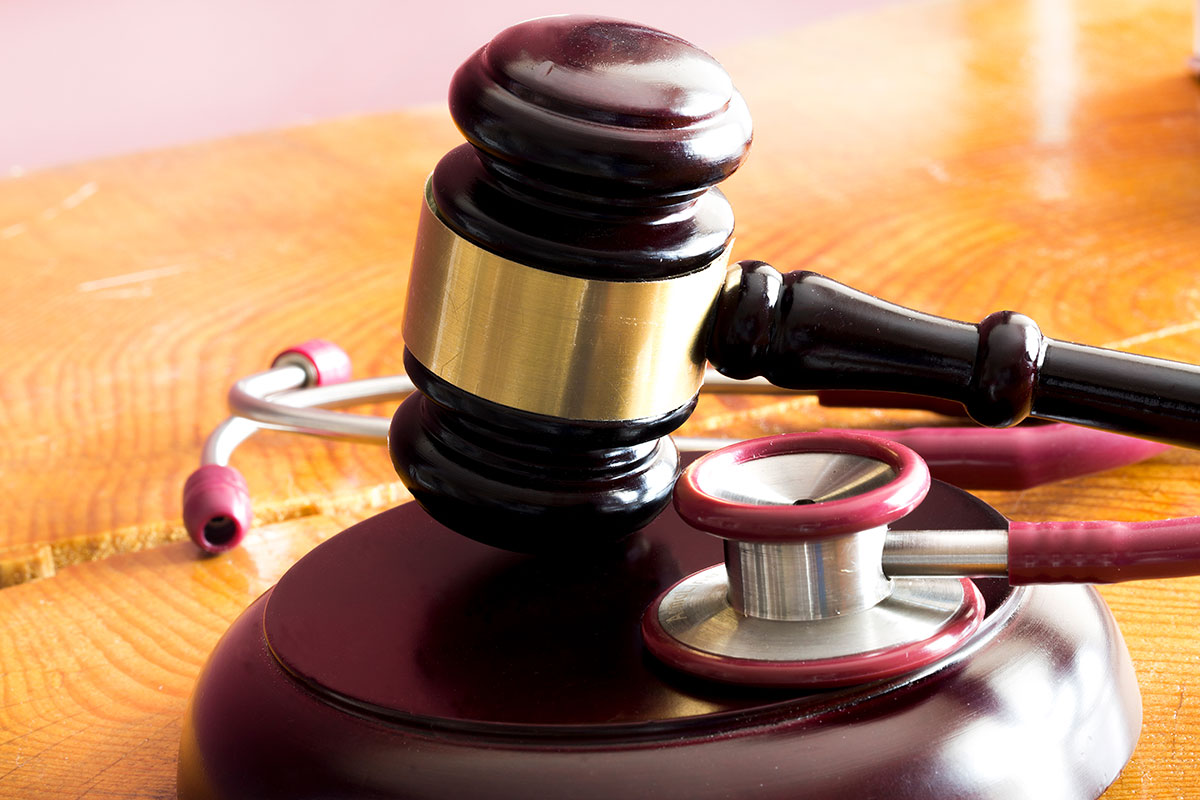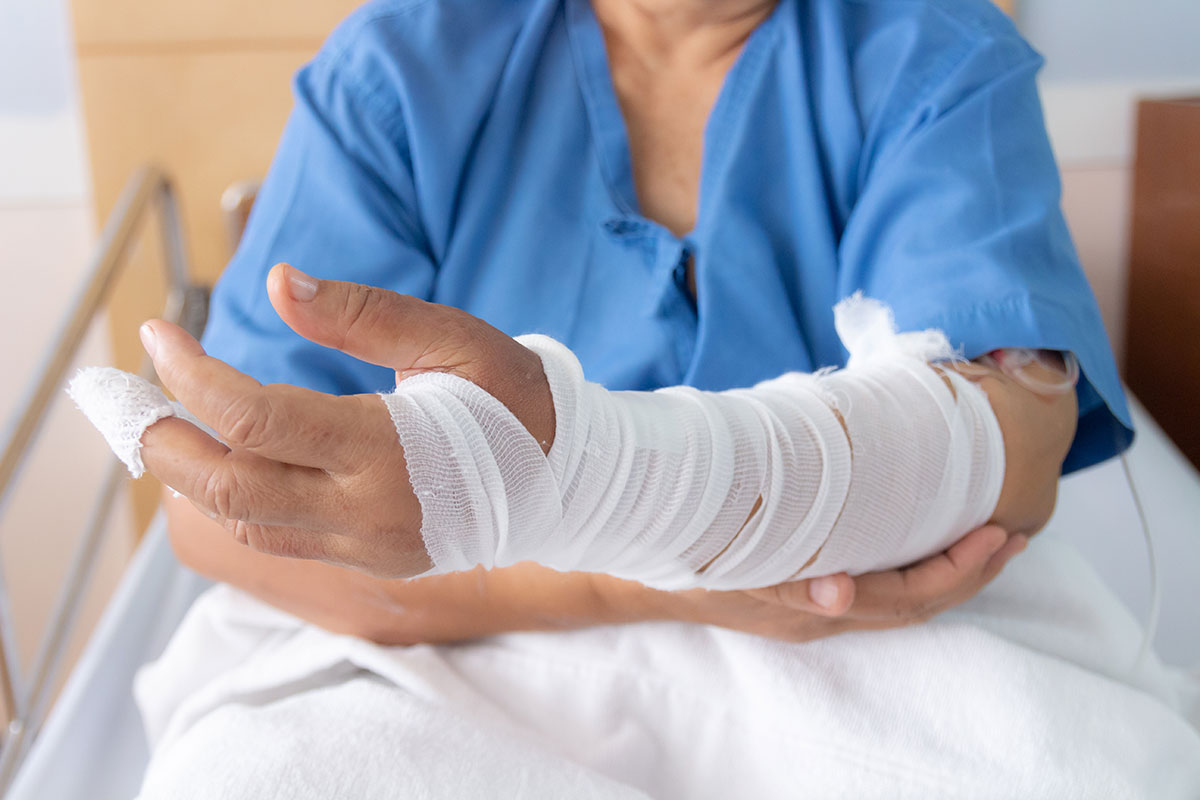Hospitals are places where you’re at your most vulnerable, whether you’re in A&E, undergoing surgery, receiving scheduled treatment or attending specialist appointments.
For this reason, it’s critical that you receive the right care throughout your visit. If you don’t, and suffer an injury, illness or worsening health as a result, the experience can be immensely damaging to your physical and emotional wellbeing.
If you have experienced hospital negligence of any kind, you may be entitled to compensation.
A compensation payout can help to cover a range of costs that you may have incurred in the aftermath of the substandard care you experienced.
At Valerie Kearins Medical Negligence Solicitors we’re on hand to take your hospital negligence claim forward, providing you with specialist support and advice from our expert hospital negligence solicitors.

Table of content:
What is hospital negligence
All hospitals have a duty of care to their patients which requires them to provide the highest possible standard of care at all times.
Any action (including inaction) by members of hospital staff which falls below an acceptable standard of care and which directly causes injury, disease or allows the health of a person to deteriorate as a result is defined as hospital negligence.
It’s important to make the distinction between injuries or trauma that are the outcome of an unsuccessful procedure or course of treatment, and those that result from clinical negligence or improper care. In order for a hospital negligence claim to be viable, it must be provable that the treatment you received was carried out in a negligent fashion by a healthcare professional who had a duty of care to you as a patient.

Medical misdiagnosis or delayed diagnosis claim
A crucial stage in any healthcare journey is diagnosis, as it defines the course of treatment that the patient must undergo. However, many hospital negligence claims are brought for misdiagnosis or delayed diagnosis. This occurs when a medical professional fails to diagnose a condition or diagnoses it incorrectly, leading to delayed or incorrect treatment. Misdiagnosis or delayed diagnosis can allow an underlying condition to progress, making treatment more difficult or even impossible.
Medication errors claim
Although many hospital negligence claims arise from treatments inside hospitals, the duty of care that a healthcare professional has to their patients extends outside as well. An incorrect prescription can cause further harm or complications to a patient, particularly if they are already in a weakened state. Medication errors include prescribing the wrong medication, administering the wrong dosage, or failing to check for potential drug interactions.
Surgical negligence claim
Another common type of hospital negligence claim is surgical errors. This can include operating on the wrong body part, leaving surgical equipment inside the patient, or causing damage to organs or tissue during surgery. Surgical errors can have serious consequences, including long-term health complications or even death.

Infections claim
Hospitals have a duty to maintain a safe and sanitary environment for patients. However, around 31 people per day develop an infection as a result of a hospital visit, such as MRSA, Clostridium Difficile and MSSA. If a patient develops an infection due to a hospital’s failure to follow proper infection control protocols, like sterilising equipment or isolating patients, there may be grounds for a negligence claim.
Errors of omission claim
Hospital negligence claims arise from the actions of healthcare professionals, but they can also be caused by inaction. A medical error of omission is when a healthcare provider fails to provide necessary treatment, care or information to a patient, which leads to harm. Errors of omission can take many forms, including failure to order necessary tests or diagnostic procedures, failure to prescribe necessary medication or provide appropriate follow-up care.
Anaesthesia errors claim
The role of the anaesthetist in a hospital is to determine the appropriate type and dosage of anaesthesia based on the patient’s medical history, current health status, and the nature of the surgical procedure. Anaesthesia is a powerful medication that requires careful monitoring and administration, and errors during this process can cause serious harm, including brain damage, cardiac arrest, or even death.
Pregnancy and birth injury claims
Finally, birth injuries are another common type of hospital negligence claim that solicitors deal with. These claims can arise when a medical professional fails to monitor the baby’s vital signs during delivery, uses excessive force during delivery, or fails to perform a necessary C-section. Birth injuries can have lifelong consequences for the baby and can be particularly devastating for parents who are expecting a healthy delivery.
Who is responsible for hospital negligence
Clinical negligence can arise from a wide range of causes, and responsibility for such negligence can often be difficult to establish. During a visit to a hospital you may receive treatment or care from any number of medical staff or members of hospital/clinic staff, including doctors, nurses, surgeons and other healthcare specialists.
Essentially, any healthcare professionals can be subject to a medical negligence claim, provided it can be proved that they breached their duty of care by causing an injury or loss through an error that is not one an average member of the profession would make. This includes:

However, it is important to note that responsibility for hospital negligence is not limited to these medical professionals alone. Hospitals and healthcare organisations like the Health Service Executive (HSE) themselves may also be held responsible for negligence, particularly if they fail to provide adequate training or supervision to their staff. Additionally, medical equipment manufacturers may be responsible for injuries caused by defective or malfunctioning medical devices.
Can I make a claim against the HSE for negligence
The HSE is responsible for the provision of healthcare services in Ireland and has a duty to ensure that patients receive safe and effective care. Hospitals funded by the HSE have a responsibility to hire qualified and competent medical professionals who can provide appropriate care for their patients. As most nurses and doctors in Ireland work for the HSE, claims of hospital negligence are often taken against it.
If you have received substandard care in a HSE hospital, you can claim against the hospital for negligence, and the HSE would be liable as a defendant nominated by the State Claims Agency (SCA). The hospital negligence claim would not necessarily name the individual healthcare professionals at fault, rather it would hold the entire hospital to be culpable. This is because State-run hospitals are covered by the Clinical Indemnity Scheme (CIS), which guarantees cover for all medical practitioners operating within them.
Although the HSE provides an important public service, it is as liable as any other healthcare provider when things go wrong. However, it should be noted that not all hospitals in Ireland are owned and funded by the HSE. There are also voluntary public hospitals, most of whose income comes from State funds. These hospitals are sometimes owned by private bodies, for example, religious orders, who would be liable for a claim if an instance of hospital negligence occurred there.
Compensation for a hospital negligence claim
The impact of hospital negligence can be potentially devastating, causing difficult and traumatic injuries, illnesses and worsening of pre-existing conditions. Of course, there is no way of getting back what was lost in these cases, but a compensation settlement that results from a successful hospital negligence claim can ensure that victims have adequate resources to deal with expenses and future requirements in the aftermath.
The amount of compensation that you receive will ultimately be determined by a number of factors, including:
As you can imagine, the nature of an injury or illness plays a large part in determining the amount of compensation awarded in a hospital negligence claim. For example, an injury such as a broken bone or minor infection might net the claimant several thousand euros, whereas a life changing spinal injury or fatality could end in settlements of hundreds of thousands, and sometimes millions.
In 2022, the Irish Examiner reported that a total of €2.4 billion has been paid out by the State in medical negligence and hospital accident claims since 2003. As such, there are precedent awards made in situations where the claimant has experienced injuries comparable to yours that can be used to help value the compensation given for a hospital negligence case.
How to make a claim for Medical Medical negligence
The following is an outline of the steps you should take to give yourself the best possible chance of a successful compensation claim for medical negligence:
Seek legal guidance
If you’ve experienced an injury or illness as a result of inadequate treatment or care in a hospital, and are wondering how to make a medical negligence claim, the best place to start is with the help of a specialist solicitor. At Valerie Kearins Solicitors, our team are happy to oblige clients with expert assistance on matters surrounding medical malpractice and hospital negligence.
Gather medical records and evidence
When it comes to compensation claims for medical negligence, the facts matter. Having evidence of medical history and documentation to support your claim lends credibility and is essential for attributing liability to the defendant in your case.
Your medical negligence solicitor will request access to your medical records, and carry out a review to develop a strong foundation for a claim. They may also decide that an independent, third-party examination may be required to satisfy whether or not medical negligence has occurred.
Proceed with a claim
If it is evident that medical negligence has occurred, the next step is for your solicitor to proceed with an action on your behalf. This will involve drafting a letter of claim that is addressed to the liable parties. This letter will state the nature of the medical negligence that occurred and invite the involved parties to settle the claim, which will be for an appropriate compensation amount determined by the specifics of your case.
Only around 3% of medical negligence cases end up going to court, as most cases are settled before this point. If your case does go to court, your solicitor will begin putting things in motion by filing the appropriate court papers. As discussed below, proceedings must be issued within two years of the negligent act so as to abide by the statute of limitations.
As you can imagine, the nature of an injury or illness plays a large part in determining the amount of compensation awarded in a hospital negligence claim. For example, an injury such as a broken bone or minor infection might net the claimant several thousand euros, whereas a life changing spinal injury or fatality could end in settlements of hundreds of thousands, and sometimes millions.
In 2022, the Irish Examiner reported that a total of €2.4 billion has been paid out by the State in medical negligence and hospital accident claims since 2003. As such, there are precedent awards made in situations where the claimant has experienced injuries comparable to yours that can be used to help value the compensation given for a hospital negligence case.
How long do I have to make a claim
In general, the sooner you can make a hospital negligence claim, the better. The Irish Statute of Limitations gives a time window in which legal actions must be commenced for medical negligence cases. The general rule is that proceedings must be issued within 2 years, less a day, of the date of the negligent act.
The law in Ireland recognizes though that often there are situations when there is a delay between the negligent act occurring and the victim realising there was any wrongdoing. In these cases, it is possible to start the two-year time limit from the moment the victim becomes aware of an injury or illness caused by a medical practitioner’s negligence. This is known as the “date of knowledge”.
It is important to note that the Irish Statute of Limitations for medical negligence governs and restricts the initiation of compensation claims for medical negligence in Ireland, but there is no limit on how long the actual proceedings can take. Hospital negligence claims can be complex, and take months, or years, to be resolved as a result.
However, at Valerie Kearins Solicitors we understand that hospital negligence cases can be incredibly traumatic and stressful. We promise to do everything in our power to make the process as straightforward as possible, with an empathetic and flexible approach that you can rely on in your time of need.

